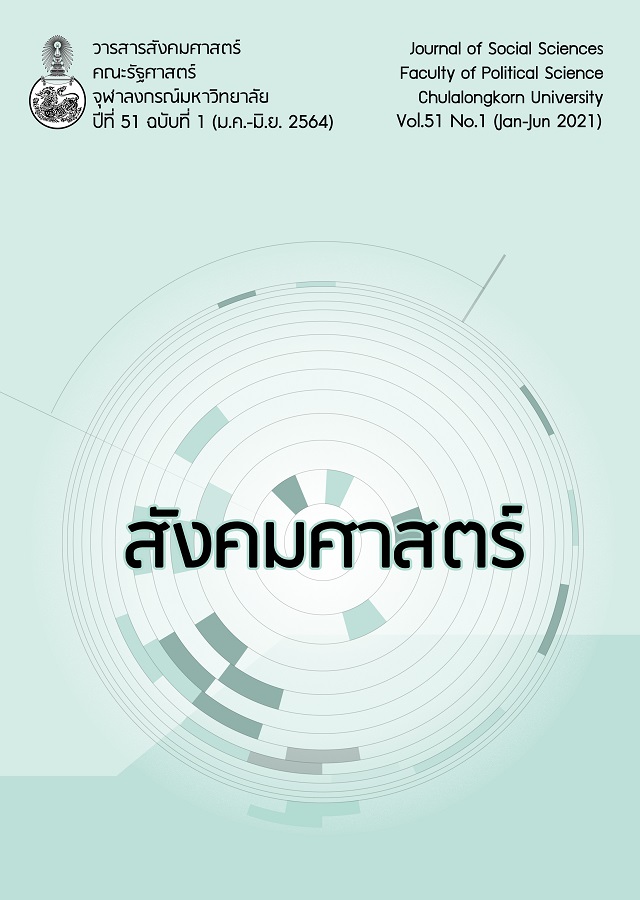A Study of Disaster Management Mechanisms at Area Level
DOI:
https://doi.org/10.61462/cujss.v51i1.693Keywords:
disaster management mechanism in area level, district cluster disaster prevention and mitigation office, disaster manager, disaster risk reductionAbstract
The establishment of the Department of Disaster Prevention and Mitigation to handle disaster management was a key agenda in the 2002 Thai Government’s policy of reforming the bureaucracy. This research article aims to investigate and analyze problems associated with disaster management at the area level and to suggest a model for improvement. By conducting case studies in 8 provinces, limitations were found in the working process, the mechanism and the management structure. The study proposes three models of structural adjustment, namely, provincial, district cluster, and district levels. However, the district cluster level is emphasized as, in terms of management principles, it stands to be the structure with the expertise and authority likely to be most able to carry out the tasks. In any case, since one size does not fit all, implementation at the area level would vary with the type of disaster, the local context. The capacity of the networking, for instance. In the end, success would depend on the capacity of the disaster prevention and mitigation managers.
Downloads
References
Harfst, Jan. 2006. A Practitioner's Guide to Area-Based Development Programming. New York: UNDP Regional Bureau for Europe and Commonwealth of Independent States.
Shah, Anwar, and Sana Shah. 2006. “The New Vision of Local Governance and the Evolving Roles of Local Governments.” In Local Governance in Developing Countries, edited by Anwar Shah, 1-46. Washington, DC: The World Bank.
Sisk, Timothy D. 2001. Democracy at the Local Level: The International IDEA Handbook on Participation, Representation, Conflict Management, and Governance.Stockholm: International Institute for Democracy and Electoral Assistance.
Siriruk Sinhasema, Wasan Luangprapat, and Pattarawut Choeisiri. 2019. Kansueksa Wichai Konkai Kan Borihan Chatkan Satharanaphai Nai Radap Phuenthi. [The Study of the Disaster Management Mechanism in Area-Level]. Bangkok: Thammasat University Research and Consultancy Institute.
Tavida Kamolvej, Vannapar Tirasangka, Sikarn lssarachaiyos, and Parichat Krongkun. 2019. Kan Okbaep Mattrakan Mai Chai Choeng Khrongsang Nai Kan Lot Khwam Siang Phaiphibat Phaendinwai Lae Akhan Thalom Samrap Prathet Thai. [Non-Structural Measure Design of Earthquake Risk Reduction in Thailand]. Bangkok: The Thailand Research Fund. (in Thai)
Wasan Luangprapat, and Chai Chaiyachit. 2019. “‘Kan Aphiban’ (Governance) Nai Thana Manothat Thang Kan Borihanratthakit.” [‘Governance’ as a Concept of Public Administration]. Ratthasatsarn 39(3): 140-199. (in Thai)
Downloads
Published
How to Cite
Issue
Section
License
Copyright (c) 2021 Faculty of Political Science, Chulalongkorn University

This work is licensed under a Creative Commons Attribution-NonCommercial-NoDerivatives 4.0 International License.
Public Licensing Terms
Copyright and Licensing Policy
The Chulalongkorn University Journal of Social Science publishes all content under the Creative Commons Attribution-NonCommercial-NoDerivatives 4.0 International License (CC BY-NC-ND 4.0).
Copyright
All published articles in the Chulalongkorn University Journal of Social Science are the copyright of the Faculty of Political Science, Chulalongkorn University. Authors transfer all rights to the journal upon acceptance of their manuscript for publication.
CC BY-NC-ND 4.0 License
Under this license:
-
Attribution (BY): Users must give appropriate credit to the authors, the Faculty of Political Science, Chulalongkorn University, and the Chulalongkorn University Journal of Social Science, provide a link to the license, and indicate if changes were made. They may do so in any reasonable manner, but not in any way that suggests the licensor endorses them or their use.
-
NonCommercial (NC): Users may not use the material for commercial purposes. Commercial use requires prior written permission from both the authors and the Faculty of Political Science, Chulalongkorn University.
-
NoDerivatives (ND): If users remix, transform, or build upon the material, they may not distribute the modified material. Adaptations of the work require prior written permission from both the authors and the Faculty of Political Science, Chulalongkorn University.
Open Access Statement
The Chulalongkorn University Journal of Social Science provides immediate open access to its content on the principle that making research freely available to the public supports a greater global exchange of knowledge. Users are allowed to read, download, copy, distribute, print, search, or link to the full texts of the articles without asking prior permission from the publisher or the author, in accordance with the CC BY-NC-ND 4.0 license.
Self-Archiving Policy
Authors may archive the final published version, preprints, or postprints of their articles in institutional repositories or on their personal websites, provided that they acknowledge the original publication in the Chulalongkorn University Journal of Social Science with a complete citation and a link to the journal's website.
Permissions
For any use beyond those covered by the CC BY-NC-ND 4.0 license, please contact:
Editorial Office
Chulalongkorn University Journal of Social Science
Faculty of Political Science, Chulalongkorn University
Email: cusocscij@gmail.com
For more information about the Creative Commons Attribution-NonCommercial-NoDerivatives 4.0 International License, please visit: https://creativecommons.org/licenses/by-nc-nd/4.0/





